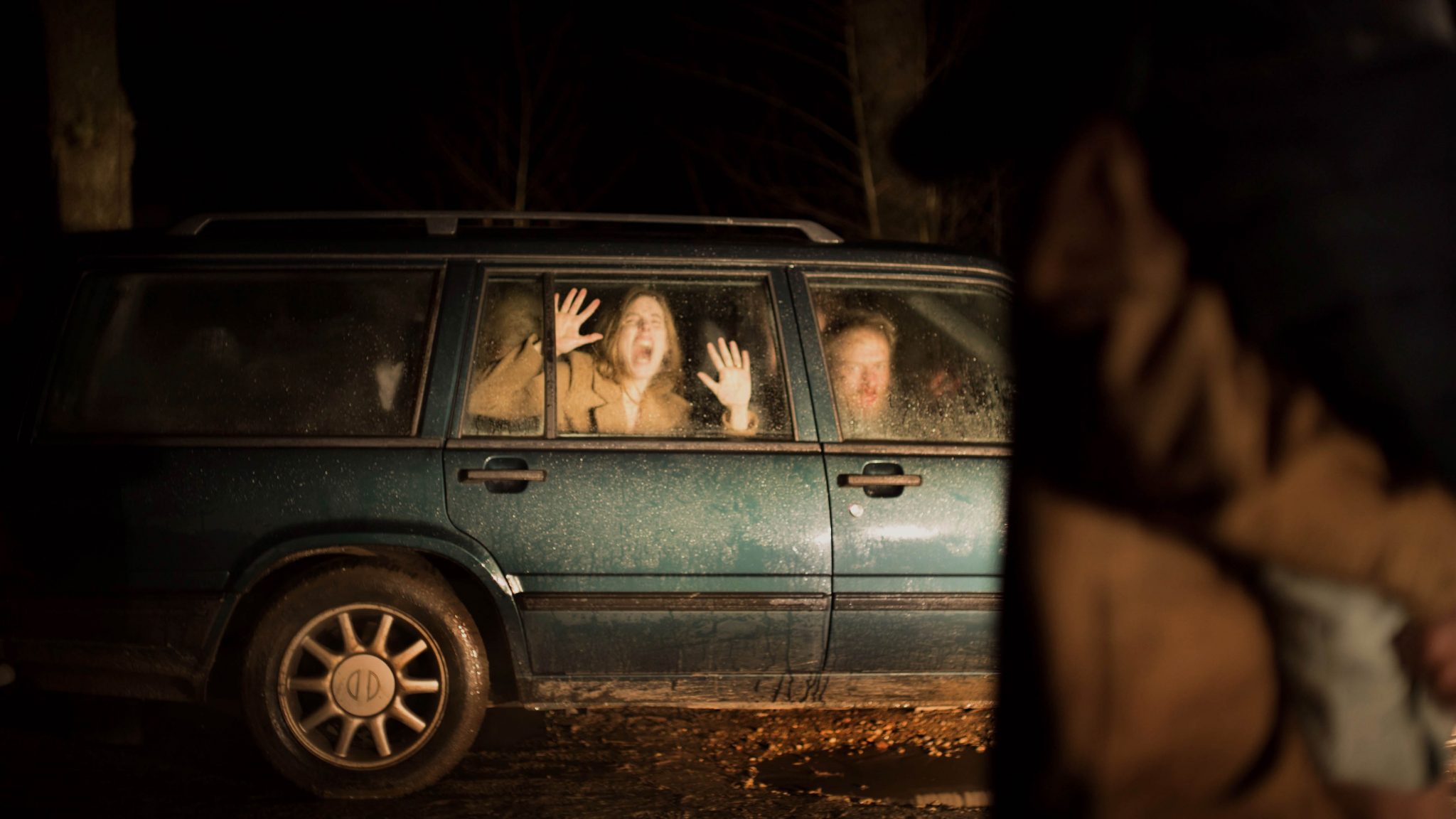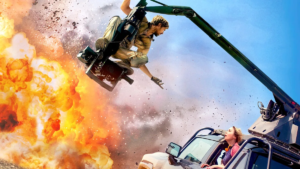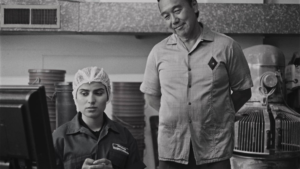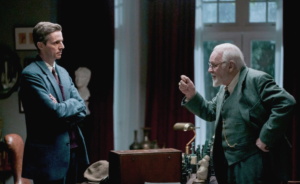ALL REVIEWS WRITTEN BY GREG KING
LAST UPDATED AUGUST 8, 2022
OF AN AGE.
The opening night film of the Melbourne International Film Festival this year was Of An Age, a queer themed drama and coming of age tale that seems to draw inspiration from the likes of Richard Linklater’s Before Midnight and the classic Brief Encounter. The film is set in 1999 and centres around Nikola (Elias Anton, from the miniseries Barracuda, etc), an 18-year-old of Serbian descent. He has recently graduated from high school. The film opens with Ebony (Hattie Hook, in her film debut) waking up disheveled and clearly distressed on a beach somewhere after a heavy night. She needs to be at the final of a ballroom dancing championship where she is partnering Nikola. In a panic she phones him asking for help. Nikola turns to her brother Adam (Thom Green) for help as he is old enough to drive. The pair share a road journey to pick up Ebony. The pair exchange chatter and stolen glances, and it is clear that there is some connection between the two. Nikola is wrestling with his own sexuality, and it is only when Adam admits that he is gay that Nikola seems able to relax and enjoy his company. This changes the dynamic between the pair an unexpected romance develops. But their brief encounter is overshadowed by the news that Adam is leaving the next day. Eleven years later the pair reconnect at Ebony’s wedding, but a lot has changed in that time. There is more of a reserve and unspoken tension between them this time around. The sophomore film from writer/director Goran Stolevski, Of An Age also seems deeply personal as the character of Nikola shares some common background with the filmmaker. He directs the material with empathy. The performances of the three leads are all uniformly good. Anton brings a brooding quality and a naivety to his role, while Green has an assured and solid presence. Hook is good and elicits plenty of laughs as the narcissistic and self-centred Ebony. The film has been beautifully shot over a period of 18 days by cinematographer Matthew Chuang (Blue Bayou, etc) and gives us some stark vistas of Melbourne. He also works in closeup, focusing in on the characters and this gives us insight into their emotions and thoughts. The drama is accompanied by a soundtrack of traditional Serbian music.

SPEAK NO EVIL.
This subtle psychological thriller comes from Danish actor turned director Christian Tafdrup. Bjorn (Morten Burian), Louise (Sidsel Siem Koch) and their daughter Agnes are a Danish family on holiday at a resort in Tuscany when they meet a Dutch family. They strike up a friendship with the affable Patrick Fedja Van Huet), a doctor working with Doctors Without Borders, his wife Karin (Karina Smulders) and their young son Abel, who doesn’t speak much due to a birth defect that left him with an abnormally small tongue. A couple of months later Bjorn and Louise are surprised to receive an invitation to visit Patrick and Karin in Holland. Initially reluctant to travel again for a while, they are persuaded to go by some friends who say: “What’s the worst that can happen?” They soon discover that something horrible awaits them. At first the visit starts off reasonably pleasant enough but soon the tension is palpable as things turn tense and begin unravelling. Bjorn and Louise do their best to remain polite in the face of some occasionally aggressive behaviour and off kilter attitudes from their hosts, especially the cruel way they treat their son. As guests in the house both Bjorn and Louise find it hard to openly criticise the behaviour of their hosts, and the atmosphere crackles with tension. As the veneer of civility and politeness is stripped away Louise grows increasingly uncomfortable and insists that they leave. A palpable air of unease begins to permeate the film and the drama becomes uneasy as it works towards its shocking climax. Speak No Evil is Tafdrup’s first feature in five years, and he has co-written the script with his brother Mads. They invert many of the usual tropes of the genre and slowly turn the screws as they ratchet up the tension and atmosphere of discomfort until the chilling climax. With its nihilistic view of family dynamics, society, technology, middle-class aspirations and violence Speak No Evil owes a debt to the likes of Michael Haneke, whose films have a nasty and sinister undercurrent. Sune Kolster’s nerve-jangling score is used sparingly but to good effect as it is ominous and filled with foreboding. Erik Molberg Hansen’s dark and atmospheric cinematography further adds to the air of unease. The four leads all deliver compelling performances.

THE LOST CITY OF MELBOURNE.
Filmed during the pandemic lockdown Gus Berger’s fascinating and superbly researched documentary is an exploration of why a city would wipe out its past in favour of modern buildings and sterile skyscrapers. Drawing upon a wealth of rare archival footage and photographs the film traces the growth of Melbourne and shows how the city’s landscape changed dramatically in the 50s and 60s as old buildings were demolished to make way for newer more modern buildings. This was the heyday of Whelan the Wrecker, who established his reputation during this period of massive redevelopment. Part of the dramatic change was due to “a perfect storm” of events in the 50s – the visit of Queen Elizabeth and the Olympic games. Melbournians felt a little embarrassed with its Victorian and Georgian era structures in the middle of the 50s. Hotels, where people like Mike Twain and Agatha Christie had stayed during visits to the city, lacked the modern amenities, and rather than allow refurbishment they were pulled down and new structures took up the space they occupied. And over a twenty-year period the city lost many treasured buildings and historical landmarks as the city tried to reinvent itself. People like entertainer Barry Humphries and journalist Keith Dunstan spoke out against the redevelopments, citing the heritage that was being sacrificed. But The Lost City Of Melbourne is also the sad story of the cinema heritage we have lost as well as an examination of the city’s relationship with cinema. As Berger points out, it was in Melbourne that the world’s first feature length film, The Story Of The Kelly Gang was shot. Berger runs a boutique cinema in Melbourne’s northern suburbs, so it is not surprising that he does focus at length on the loss of many cinemas and elegant picture palaces over the years. The Lost City Of Melbourne is a love letter to Melbourne itself but it is also a poignant eulogy to our lost history.




